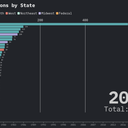
Two men charged with killing Philadelphia Police Sgt. Robert Wilson III have been sentenced to life without possibility of parole, plus an additional term of 50 to 100 years, as prosecutors in one of the nation’s largest death-penalty counties agreed not to seek the death penalty in exchange for the defendants’ guilty pleas. Philadelphia District Attorney Larry Krasner (pictured) appeared in court on June 25 to personally explain the rationale behind the plea deal that ensures brothers Carlton Hipps and Ramone Williams will spend the rest of their lives in jail. Krasner told the court that the mothers of Sgt. Wilson’s two young children “do not want the death penalty” and that the plea deal would “minimize the re-traumatization” that would occur if they were exposed to a capital trial and lengthy appeals. Krasner said “[t]he death penalty in Pennsylvania is not what people think it is. The reality is people are not executed in Pennsylvania. They die in custody on death row.” The plea deal drew highly publicized criticism from the Philadelphia Fraternal Order of Police and other members of Wilson’s family who wanted the death penalty to be pursued. It also provoked opposition from activists who said that Krasner’s use of the death penalty as leverage for the guilty pleas violated his campaign promise never to seek death sentences. The Philadelphia lodge of the FOP — who, along with former prosecutors who were fired from or left the DA’s office, have engaged in a prolonged public relations war against Krasner’s proposals for criminal-justice reform — called the plea deal “despicable.” On social media, it urged its members to attend the sentencing to “show support” for the Wilson family. Krasner said that the mothers of Wilson’s children had received threatening messages, which they believed were from the FOP, pressuring them to ask Krasner to seek the death penalty. Only family members who opposed the deal came to the court hearing. Krasner’s decision not to seek the death penalty comes in the wake of a twenty-year decline in Philadelphia’s use of capital punishment. The city imposed 99 death sentences in the 1990s, 21 in the first decade this century, and fewer than one every other year in the 2010s. Nearly 150 death sentences imposed in the city since the 1970s have been overturned, and there has been only a single execution. After highlighting the high cost of capital punishment, Krasner said, “A choice to waste money may be a choice to endanger police officers. And frankly, if you really want to get down to it, when did the death penalty prevent this outcome? The death penalty has not stopped it here. The death penalty has not stopped it in the past. And, every bit of scientific evidence indicates that it’s not going to stop it in the future.” A Death Penalty Information Center analysis of FBI murder data has shown that over the last three decades, police officers have been killed at a rate that is 1.37 times higher in states that currently have the death penalty than in states that have long abolished it.
(Max Mitchell, Krasner Personally Appears to Explain Choice to Eschew Death Penalty in Killing of Phila. Police Sgt., The Legal Intelligencer, June 25, 2018; Michael Tenenbaum, Krasner defends decision not to pursue death penalty in murder of Philly cop, Philly Voice, June 25, 2018; Abraham Gutman, ‘Never’ death penalty is what got Larry Krasner elected. Now, that campaign promise is broken, June 25, 2018; Chris Palmer, Slain cop’s family says DA’s Office is offering his accused killers a plea deal, Philadelphia Inquirer, June 23, 2018.) See Sentencing and Deterrence.


